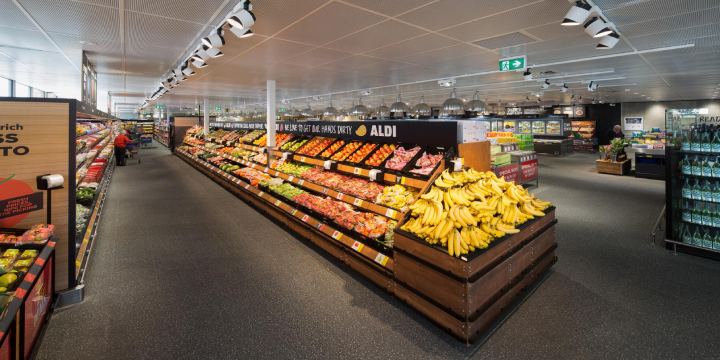
Disrupting the Grocery Industry with Unmatched Efficiency and Technological Innovation
ALDI, a German-born supermarket chain, has carved out a significant niche in the U.S. grocery market. Known for its no-frills, cost-efficient approach, ALDI is a force to be reckoned with, consistently delivering low prices without compromising quality. With nearly 2,400 stores across the U.S. and plans to expand by adding 800 more by 2028, ALDI is rapidly gaining ground as one of the fastest-growing grocery chains in the country.
Despite the company’s small-format stores and streamlined inventory, ALDI has been on the cutting edge of integrating technology into its operations. From AI-powered supply chain solutions to checkout-free shopping experiences, ALDI’s recent technological innovations are positioning it as a trailblazer in the grocery space.
At the core of ALDI’s success is its relentless focus on simplicity and efficiency. With a limited assortment of 1,650 products compared to a typical supermarket’s 31,000, ALDI ensures that every product has been meticulously selected, allowing the company to operate with smaller footprints and lower overhead costs. This strategy is supported by a workforce model where employees take on multiple roles—from stocking shelves to operating checkout lines—further driving operational efficiencies.
By stocking primarily private-label goods, which make up over 78% of its inventory, ALDI cuts out the middleman, allowing for direct partnerships with manufacturers. This enables the company to pass on savings to its customers, making it a favorite for price-conscious shoppers, especially during periods of inflation. As CEO Jason Hart emphasized, “We don’t really focus on what the competition is doing. We’re focused on what consumers want and need.”
While other grocery retailers scramble to balance quality and price, ALDI has remained steadfast in its mission to offer consumers the best prices, a goal that has propelled its rapid expansion in the U.S. In 2023, ALDI announced the acquisition of 400 Winn-Dixie and Harveys Supermarket locations, a move that underscores the company’s long-term growth strategy. With plans to open 800 additional stores by 2028, ALDI is set to become an even more formidable competitor in the grocery landscape.
But it’s not just about expanding physical locations—ALDI is continually looking for ways to innovate. One of its most notable technological advancements is the launch of ALDIgo, a checkout-free shopping system powered by Grabango. This system, first introduced in a store in Aurora, Illinois, allows customers to skip traditional checkout lines by using computer vision to automatically track items in their cart. “It’s exciting to see a checkout-free capability live in one of our stores,” said Eric Traxler, Vice President of IT at ALDI, emphasizing the company’s commitment to enhancing customer experience through innovation.
We’re always looking for opportunities to lower prices, to reduce our cost of doing business, and to lean in on our lower prices. So that’s what we’re all about.

Expansion and Innovation Amid Rising Competition
A Lean Model Driving Cost Savings and Consumer Value
In addition to ALDIgo, ALDI has partnered with Instacart to roll out a suite of new digital tools aimed at streamlining the shopping experience. One of the key innovations is the Caper Cart, a smart shopping cart that allows customers to view their running total on a digital screen as they shop. By eliminating the need to scan items individually at checkout, Caper Carts offer a seamless shopping experience.
ALDI’s collaboration with Instacart doesn’t stop there. The company has introduced In-Store Mode, a feature within the Instacart app that helps customers locate items, view in-store promotions, and sort their shopping lists by aisle. This integration is just one example of how ALDI is leveraging technology to make grocery shopping faster and more efficient.
ALDI’s commitment to efficiency extends beyond the sales floor. In its quest to streamline operations, the company has embraced an AI-first approach through its multi-year partnership with Genpact. This collaboration focuses on optimizing ALDI’s business services by leveraging AI and digital platforms like S/4HANA and ServiceNow. By improving processes across the supply chain and back-office operations, ALDI aims to reduce costs while enhancing agility.
AI is also playing a role in ALDI’s logistics. The company has introduced advanced replenishment systems that rely on machine learning algorithms to predict inventory needs and optimize product placement. This system ensures that shelves are always stocked with the most in-demand items, reducing waste and improving the overall shopping experience.
As the grocery industry faces mounting pressure from rising food costs and supply chain disruptions, ALDI’s proactive approach to technology and automation is helping it stay ahead of the curve. “Our business model, which is based on simplicity and efficiency, really provides savings for customers and also saves them time when they’re shopping with their grocery lists,” said Jason Hart.
Enhancing the Customer Experience with Instacart
Operational Excellence Powered by AI and Automation

In an era where inflation has forced many consumers to rethink their grocery shopping habits, ALDI’s private-label strategy has proven to be a significant advantage. As of late 2023, 54% of shoppers indicated that they would opt for less expensive store-branded products, such as those offered by ALDI, over national brands. This trend has helped the company weather economic challenges and even expand its customer base.
Recognizing the growing demand for sustainable practices, ALDI has also urged its suppliers to cut costs while adopting eco-friendly initiatives. During its first-ever U.S. supplier summit, the company encouraged partners to reduce waste, bring production closer to stores, and focus on sustainable packaging. In return, ALDI has committed to supporting these efforts through long-term contracts and collaborative business development initiatives.
As ALDI continues to expand, the company shows no signs of slowing down. With plans to add hundreds of stores in the coming years, the grocer is poised to play an even larger role in shaping the future of U.S. grocery retail. ALDI’s blend of aggressive expansion, technological innovation, and a commitment to low prices has made it a formidable competitor in a crowded market.
In an increasingly digital world, ALDI’s ability to adapt and innovate while staying true to its core values of simplicity and efficiency has earned it the loyalty of millions of customers. As CEO Jason Hart puts it, “Twenty-five percent of U.S. customers now shop at Aldi. That’s twice what it was just six years ago.”
ALDI’s success in the U.S. grocery market can be attributed to its laser focus on cost efficiency, innovation, and customer satisfaction. From the introduction of checkout-free shopping with ALDIgo to the roll-out of AI-driven supply chain solutions, ALDI has shown that it is willing to invest in technology to enhance the customer experience while keeping prices low. As the company continues to expand, it is clear that ALDI’s lean business model and forward-thinking approach will keep it ahead of the competition for years to come.



